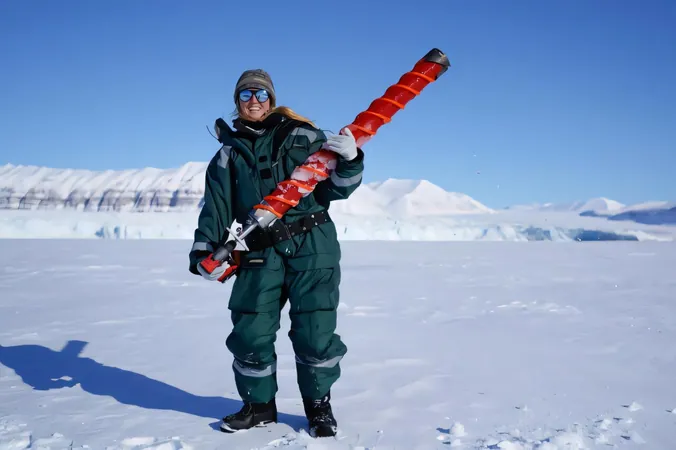
Is the Polar Food Chain on the Brink of Collapse? The Shocking Truth About Vanishing Sea Ice!
2024-12-11
Author: Wei Ling
The Crucial Role of Microalgae in Polar Ecosystems
Climate change has set off alarm bells in the polar regions, with rapid sea ice loss and increasing ocean acidification wreaking havoc on the growth and nutritional quality of microscopic algae. These minuscule organisms play a vital role in the Arctic and Antarctic ecosystems, serving as the foundational food source for fish, krill, and numerous other small creatures that support larger predators, including majestic whales, agile seals, and charming penguins.
Alarming Trends in Sea Ice
Sea ice is not just frozen water; it is a critical habitat for these microalgae. Yet, alarming statistics reveal a dramatic reduction in both the thickness and coverage of sea ice. For the last four consecutive years, Antarctic sea ice has plunged to record low levels, and researchers are growing increasingly concerned that by 2050, the Arctic Ocean could be devoid of ice during the summer months.
Insights from Polar Marine Ecologist Dr. Rebecca Duncan
Enter polar marine ecologist Dr. Rebecca Duncan, who has dedicated the last eight years to field studies in these rapidly changing polar regions. A notable scholar, she earned her Ph.D. through a collaborative program between the University Technology Sydney (UTS) and UNIS Svalbard in 2024, and was recently honored with the prestigious Australian Institute of Nuclear Science and Engineering Thesis Gold Medal. As a passionate advocate for women in STEM fields, Dr. Duncan has been named a "Superstar of STEM" by Science and Technology Australia—a recognition of her groundbreaking work.
A Call to Action for Polar Ecosystems
Dr. Duncan warns that one-tenth of the world's oceans are frozen, including the fragile ecosystems of the Arctic, Antarctic, and Southern Ocean. "These ecosystems rely heavily on microscopic algae as the cornerstone of their food webs," she explains. "Without these tiny but crucial organisms, the entire food chain teeters on the brink of collapse."
The Nutritional Value of Microalgae
The nutritional value of microalgae—rich in essential fats, proteins, and carbohydrates—varies not only by species but also in response to changing environmental conditions. Dr. Duncan’s groundbreaking research indicates that factors such as ocean acidification, rising temperatures, and varying light availability under the ice significantly affect the composition of these algae. While increased light and warmer waters can initially boost fat content in common algae species, there comes a critical tipping point where their ability to accumulate essential nutrients falters—transforming the quality of food available for marine life.
Impact on Marine Life
Moreover, krill and other critical zooplankton rely on these microalgae to thrive and reproduce during specific seasons. A disruption in this complex relationship threatens not just the zooplankton, but ultimately fish populations and larger marine mammals like seals.
Consequences of Melting Sea Ice
"We're already seeing the consequences. When sea ice melts more rapidly, it creates an unstable environment for microalgae, as the increased light and faster melting can hinder their life cycles," warns Dr. Duncan. "If sea ice is lost entirely, the microalgae dependent on it will vanish, leaving a gaping hole in the ecosystem. Can these ecosystems survive without sea ice? And if so, what will replace it? These are questions we still need answers to."
Dr. Duncan's Research and Discoveries
Dr. Duncan has shared her discoveries in five published papers, with her latest research highlighting seasonal environmental transitions and metabolic adaptations in sea-ice algae. Her work is crucial, as it sheds light on the complex interactions at play within the polar food chain.
Exploring the Arctic: Dr. Duncan's Research Missions
To gather her samples, Dr. Duncan, alongside a dedicated international research team, journeys to Longyearbyen, Svalbard—an Arctic island north of Norway. Using snowmobiles and icebreaker ships, they drill into the frigid ocean to collect essential data. Back in Australia, Dr. Duncan employs cutting-edge technology, ranging from microscopy to particle accelerators, to gain insights that could hold the key to understanding these ecosystems on a cellular level.
The Future of Polar Food Chains
As the world watches, the fate of the polar food chain hangs in the balance. Will microalgae be able to adapt, or is their demise imminent? Dr. Duncan’s ongoing research might just provide the answers we desperately need in the fight against climate change. Stay tuned for more updates on this critical environmental issue!
 Brasil (PT)
Brasil (PT)
 Canada (EN)
Canada (EN)
 Chile (ES)
Chile (ES)
 Česko (CS)
Česko (CS)
 대한민국 (KO)
대한민국 (KO)
 España (ES)
España (ES)
 France (FR)
France (FR)
 Hong Kong (EN)
Hong Kong (EN)
 Italia (IT)
Italia (IT)
 日本 (JA)
日本 (JA)
 Magyarország (HU)
Magyarország (HU)
 Norge (NO)
Norge (NO)
 Polska (PL)
Polska (PL)
 Schweiz (DE)
Schweiz (DE)
 Singapore (EN)
Singapore (EN)
 Sverige (SV)
Sverige (SV)
 Suomi (FI)
Suomi (FI)
 Türkiye (TR)
Türkiye (TR)
 الإمارات العربية المتحدة (AR)
الإمارات العربية المتحدة (AR)